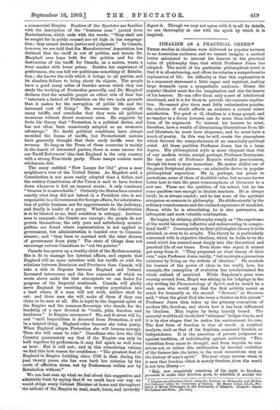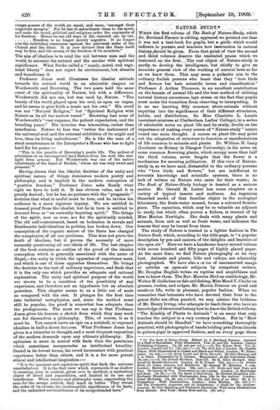IDEALISM AS A PRACTICAL CREED.* THEsz studies in idealism were
delivered as popular lectures to an Australian audience, and we cannot imagine a method better calculated to interest his hearers in the practical value of philosophy than that which Professor Jones has adopted. The merit of his particular philosophical creed is that it' is all-embracing, and offers its votaries a comprehensive explanation of life. Its difficulty is that this explanation is in a summary statement a little vague and mystical, making large demands upon a sympathetic audience. Hence the popular idealist must fire the imagination and stir the hearts of his hearers. He can offer them only a sort of intellectual shorthand, and it is for them to provide the concrete explica- tion. He cannot give them neat little ratiocinative puzzles, the solution of which affords an audience a certain minor satisfaction. For good or ill, idealism is a large gospel, and no teacher in a dozen lectures can do more than outline the form of its argument. To interest his hearers he must, therefore, have a wealth of illuminating illustrations from lifo and literature, he must have eloquence, and he must haVe touch of poetry. In this way he will create the atmosphere which favours the comprehension of an essentially spiritual creed. All these qualities Professor Jones has in a large degree. His philosophical style is more eloquent than that of any modern writer, except, perhaps, Professor Santayana. He has much of Professor Royce's wistful graciousness, though his tone is more masculine. He makes skilful use of the great Scriptural phrases,--an admirable device in popular philosophical exposition. He is, perhaps, too prone to quotations, some of them of doubtful value, but no man knows better how to turn the great commonplaces of literature to a new use. These are the qualities of his school, but he has some qualities rare enough in idealist teachers. He is always lucid; he is always candid ; and he has none of the spiritual arrogance so common in philosophy. He abides stoutly by the ordinary consciousness and the realised experience of mankind. Hence, while he is stimulating, he is also persuasive, an infrequent and most valuable combination.
He begins by defining philosophy simply as "the experience of the world becoming reflective and endeavouring to compre- hend itself." Consequently no final philosophic theory is to be attained, or even to be sought. The theory he is particularly concerned with is objective idealism, which he holds to be the creed which has entered moat deeply into the theoretical and practical life of our times. Even those who reject it cannot get away from it. " They propound no rival theory of their own," says Professor Jones neatly, " but maintain a precarious existence by living on the defects of idealism." He reminds
his hearers of the power of ideas in the • world, how, for example, the conception of evolution has revolutionised the whole outlook of mankind. While Napoleon's guns were roaring around Jena, Hegel was sitting in his lodgings in the city writing his Phenomenology of Spirit, and he would be a rash man who would say that the first activity meant as
much for humanity as the second. "Beware," as Emerson said, "when the great God lets loose a thinker on this planet."
Professor Jones then takes up the primary conception • of
modern life, freedom, and shows how it has been influenced by idealism. Man begins by being heavily bound. The
material world in all its shallow "alienness " hedges him in, and
• it is by slow stages that he makes his environment his own. The• first form of freedom is that of revolt. A sceptical 'analysis, such as that of the Sophists, construed •freedom as independence: It is the assertion of private judgment as
agairist tradition, of individuality against authority. "This transition: from sense to thought, and from impulse to con- scious act, or rather this sublimation by internal evolution
of the forMer into the latter; is the most momentous step in the history of man's spirit?' The next stage arrives when: it is seen that freedom which is merely freedom front the world is not true liberty • ajgan, now oompletely conscious ofhis right to freedom,• proceeds ,to .make that freedom good, to eatables it amidst the
.
IdeaLimz en a Proof:oaf LYeed: boifif the Laturet Phaosopitp and Modern Detivered before' therUniiersity 'Sydow*. • By Henry 7onee, LL.Di. Pro-
feseor of Mora ,P niversity of Glasgow. Glasgow: amines
aiacZebose Sod. • .netpa .
. . extant powers of the world; an equal, and more, 'amongst their mightiest energies.' For he has to subordinate them to his spirit, and make the social, political and religious order the exponents of his freedom. Hence we see old ways of life. restored one by one. . . . . . . Freedom is no longer merely negative. It no longer sets the individual conscience against the universal order of the Church and the State. It is now divined that the State itself may be free, and the means of the freedom of its members."
The aim of idealism is to rend the veil between man and the world,-to saturate the natural and the secular with spiritual significance. What Burke called a," manly, moral, and regu- lated liberty " does not reject its environment, but absorbs and transforms it.
Professor Jones next illustrates the idealist attitude towards the natural world in an admirable chapter on Wordsworth and Browning. The two poets held the same creed of the spirituality of Nature, but with a difference. Wordsworth did not use, but was used by, Nature. " The beauty of the world played upon his soul, as upon an organ, and he seems to give forth a music not his own." His creed was not " Natural Religion," but " Spiritual Religion with Nature as its all too narrow vessel." Browning had none of Wordsworth's "vast expanse, the patient expectation, and the brooding peace." His doctrine was interaction, rather than interfusion. Nature to him was "rather the instrument of the universal soul and the external exhibition of its might and love, than its living embodiment." He is like the man of a stout countenance at the Interpreter's House who has to fight hard for his peace :—
" This is the parable of Browning's poetic life. The ardour of adventure in an unconquered land flashes from his soul like sun- light from armour. But Wordsworth was one of the native inhabitants of the Land of Beulah, ' whose air was very sweet and pleasant.' " Having shown that the idealist doctrine of the unity and spiritual nature of things dominates modern poetry and
philosophy, and is implicit in the modern conception of " positive freedom," Professor Jones asks finally what right we have to hold it. It has obvious value, and it is greatly desired ; but he has no patience with the " pragmatic " doctrine that what is useful must be true, and he invites his audience to a more rigorous inquiry. We are entitled to demand proof from the idealist, but he in turn is entitled to demand from us " an earnestly inquiring spirit." The things of the spirit, now as ever, are for the spiritually minded.
The old self-contentment, based on hedonism in morals and Benthamite individualism in politics, has broken down. Our conception of the organic nature of the State has changed the complexion of all our problems. This does not prove the truth of idealism, but it proves the necessity of more earnestly questioning all our ideals of life. The last chapter of the book contains an outline of the proof of the idealist conception which is generally associated with the name of Hegel,—the unity in which the opposites of experience meet, and which is one of these opposites themselves. He brings the doctrine to the test of ordinary experience, and finds that it is the only one which provides an adequate and rational explanation. The unity and spiritual purpose of the world are shown to be a condition of the possibility of any experience, and therefore not an hypothesis but an absolute
postulate. This chapter seems to us a little out of scale as compared with the rest.. It plunges for the first time
into technical metaphysics, and, since the method must still be popular, the proof is somewhat less adequate than the prolegomena. The most we can say is that Professor Jones gives his hearers a sketch from which they may work out for themselves a philosophy. This, of course, is as it must be. You cannot carve an epic on a nutshell, or expound idealism in half-a-dozen lectures. What Professor Jones has given is a stimulus to thought, and a most eloquent exposition of the modern demands upon any ultimate philosophy. His optimism is more in accord with facts than the pessimism which sometimes masquerades as intellectual humility. Stated in its lowest terms, his creed harmonises with practical experience better than others, and it is a far more potent ethical and intellectual inspiration:-
" It is the ignorant and capricious spirit that finds the universe unsatisfactory. It is the first view which represents it as shallow in meaning, poor in content, given over to accident, a mysterious object of dread and superstition, and limited in its use and beneficence. When science and philosophy "come, superseding the sane for the savage outlook, they teach us better. They reveal the order of its events, the inexhaustible significance of its facts, and the unlimited serviceableness of its comprehended laws."











































 Previous page
Previous page